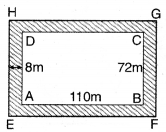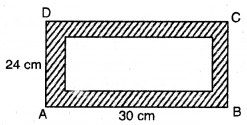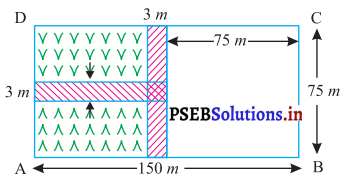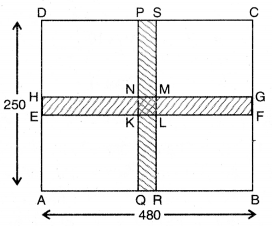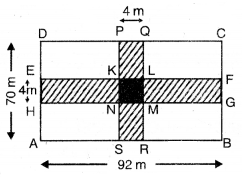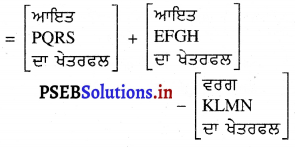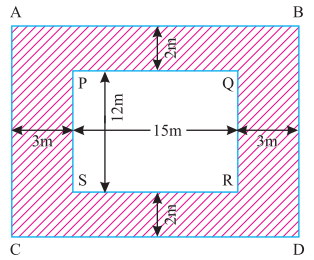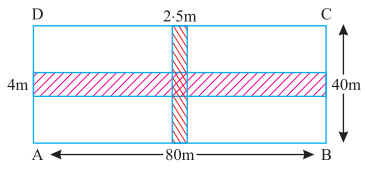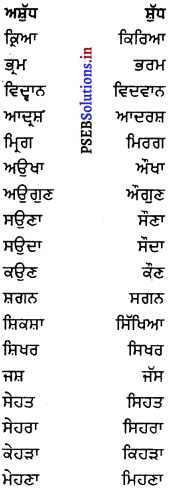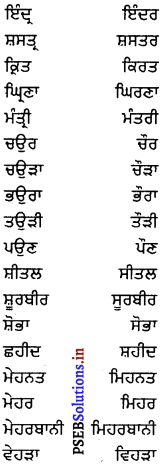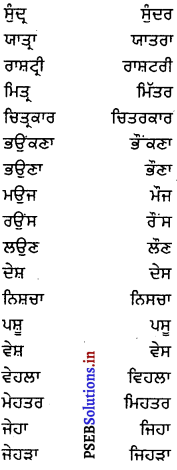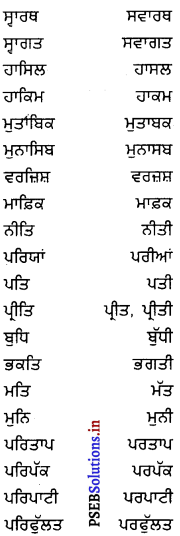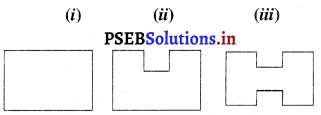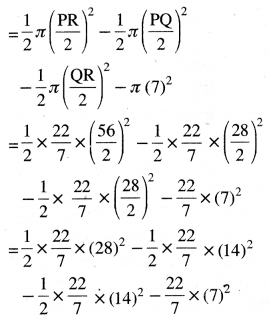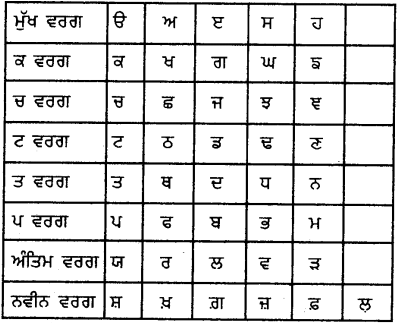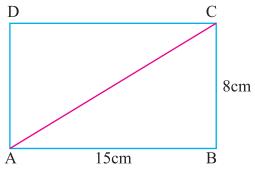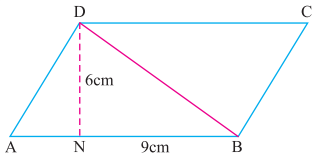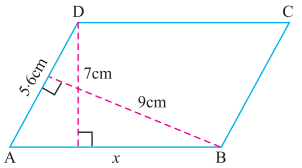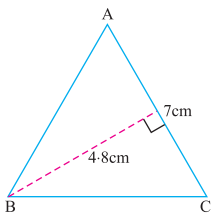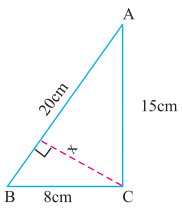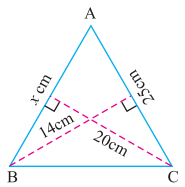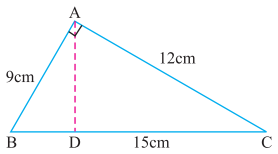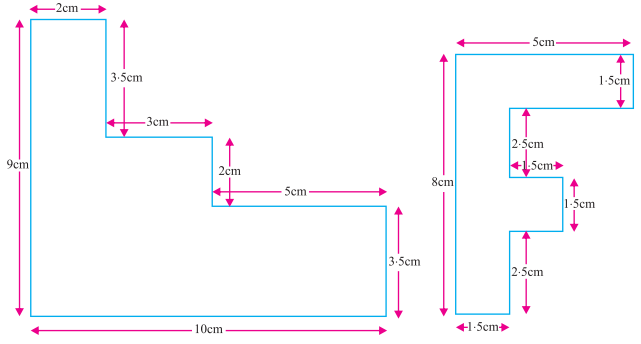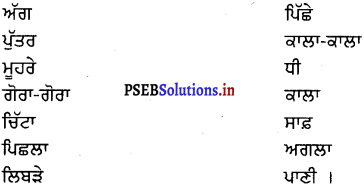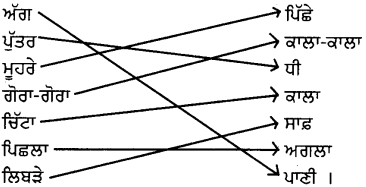Punjab State Board PSEB 8th Class Punjabi Book Solutions Punjabi Grammar Ling, Vyakarana ਲਿੰਗ Textbook Exercise Questions and Answers.
PSEB 8th Class Punjabi Grammar ਲਿੰਗ (1st Language)
ਪ੍ਰਸ਼ਨ 1.
ਲਿੰਗ ਕੀ ਹੈ? ਇਹ ਕਿੰਨੀ ਪ੍ਰਕਾਰ ਦੇ ਹੁੰਦੇ ਹਨ?
ਜਾਂ
ਲਿੰਗ ਦੀ ਪਰਿਭਾਸ਼ਾ ਲਿਖੋ। ਇਹ ਕਿੰਨੀ ਪ੍ਰਕਾਰ ਦੇ ਹੁੰਦੇ ਹਨ?
ਉੱਤਰ :
ਪਰਿਭਾਸ਼ਾ – ਸ਼ਬਦ ਦਾ ਪੁਰਖਵਾਚਕ ਤੇ ਇਸਤਰੀਵਾਚਕ ਭਾਵ ਉਸ ਦਾ ਲਿੰਗ ਹੁੰਦਾ ਹੈ, ਜੋ ਕਿ ਜਾਨਦਾਰ ਚੀਜ਼ਾਂ ਵਿਚ ਨਰ – ਮਦੀਨ, ਨਿਰਜੀਵ ਜਾਂ ਸਥੂਲ ਚੀਜ਼ਾਂ ਦੇ ਵੱਡੇ – ਛੋਟੇ ਆਕਾਰ ਜਾਂ ਸ਼ਕਲ ਨੂੰ ਨਿਸਚਿਤ ਕਰਨ ਤੋਂ ਬਿਨਾਂ ਆਪ – ਮੁਹਾਰੇ ਰੂਪ ਵਿਚ ਵੀ ਵਿਚਰਦਾ ਹੈ ਤੇ ਵਾਕ ਦੇ ਹੋਰਨਾਂ ਸ਼ਬਦਾਂ ਨੂੰ ਵੀ ਪ੍ਰਭਾਵਿਤ ਕਰਦਾ ਹੈ।
ਲਿੰਗ ਦੋ ਪ੍ਰਕਾਰ ਦਾ ਹੁੰਦਾ ਹੈ – ਪੁਲਿੰਗ ਅਤੇ ਇਸਤਰੀ ਲਿੰਗ :
(ਉ) ਪੁਲਿੰਗ – ਪੁਰਖਵਾਚਕ ਭਾਵ ਨੂੰ ਪ੍ਰਗਟ ਕਰਨ ਵਾਲਾ ਸ਼ਬਦ ਪੁਲਿੰਗ ਹੁੰਦਾ ਹੈ, ਜੋ ਜਾਨਦਾਰ ਚੀਜ਼ਾਂ ਵਿਚ ਨਰ ਭਾਵ ਨੂੰ ਅਤੇ ਨਿਰਜੀਵ ਚੀਜ਼ਾਂ ਦੇ ਵੱਡੇ ਆਕਾਰ ਜਾਂ ਸ਼ਕਲ ਨੂੰ ਪ੍ਰਗਟ ਕਰਨ ਤੋਂ ਬਿਨਾਂ ਆਪ – ਮੁਹਾਰੇ ਰੂਪ ਵਿਚ ਵੀ ਵਿਚਰਦਾ ਹੈ ਤੇ ਵਾਕ ਦੇ ਹੋਰਨਾਂ ਸ਼ਬਦਾਂ ਨੂੰ ਵੀ ਪ੍ਰਭਾਵਿਤ ਕਰਦਾ ਹੈ; ਜਿਵੇਂ – ਮੰਡਾ, ਬਲਦ, ਪਹਾੜ ਆਦਿ।
(ਅ) ਇਸਤਰੀ ਲਿੰਗ – ਇਸਤਰੀਵਾਚਕ ਭਾਵ ਨੂੰ ਪ੍ਰਗਟ ਕਰਨ ਵਾਲਾ ਸ਼ਬਦ ਇਸਤਰੀ ਲਿੰਗ ਹੁੰਦਾ ਹੈ, ਜੋ ਜਾਨਦਾਰ ਚੀਜ਼ਾਂ ਵਿਚ ਮਦੀਨ ਭਾਵ ਨੂੰ ਅਤੇ ਨਿਰਜੀਵ ਤੇ ਸਭੁਲ ਚੀਜ਼ਾਂ ਦੇ ਛੋਟੇ ਆਕਾਰ ਜਾਂ ਸ਼ਕਲ ਨੂੰ ਪ੍ਰਗਟ ਕਰਨ ਤੋਂ ਬਿਨਾਂ ਆਪ – ਮੁਹਾਰੇ ਵਿਚ ਵੀ ਵਿਚਰਦਾ ਹੈ ਤੇ ਵਾਕ ਦੇ ਹੋਰਨਾਂ ਸ਼ਬਦਾਂ ਨੂੰ ਪ੍ਰਭਾਵਿਤ ਕਰਦਾ ਹੈ; ਜਿਵੇਂ – ਕੁੜੀ, ਗਾਂ, ਪਹਾੜੀ ਆਦਿ।
![]()
ਪ੍ਰਸ਼ਨ 2.
ਪੁਲਿੰਗ ਨਾਂਵਾਂ ਤੋਂ ਇਸਤਰੀ ਲਿੰਗ ਬਣਾਉਣ ਦੇ ਨੇਮ ਦੱਸੋ। ਉਦਾਹਰਨਾਂ ਵੀ ਦਿਓ।
ਉੱਤਰ :
ਲਿੰਗ ਬਦਲੀ ਦੇ ਬਹੁਤ ਸਾਰੇ ਨਿਯਮ ਹਨ। ਅੱਗੇ ਇਹਨਾਂ ਨਿਯਮਾਂ ਨੂੰ ਉਦਾਹਰਨਾਂ ਸਹਿਤ ਪੇਸ਼ ਕੀਤਾ ਜਾਂਦਾ ਹੈ
1. ਜੇਕਰ ਪੁਲਿੰਗ ਨਾਂਵ ਦੇ ਅਖੀਰ ਵਿਚ ਮੁਕਤਾ ਅੱਖਰ ਹੋਵੇ, ਤਾਂ ਉਹਨਾਂ ਦੇ ਅੱਗੇ ਬਿਹਾਰੀ ‘ਨੀ’, ‘ਣੀ, ਕੰਨਾ, “ਕੰਨਾ + ਈਂ”, “ਕੀ ਜਾਂ ‘ੜੀ ਨੂੰ ਵਧਾ ਕੇ ਇਸਤਰੀ ਲਿੰਗ ਬਣਾਇਆ ਜਾਂਦਾ ਹੈ; ਜਿਵੇਂ
(ਉ) ਬਿਹਾਰੀ ਵਧਾ ਕੇ
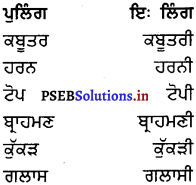
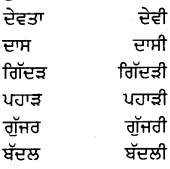

(ਅ) ‘ਨੀਂ’ ਵਧਾ ਕੇ
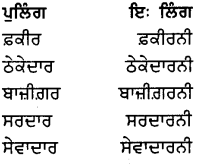
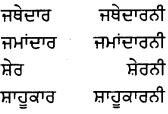
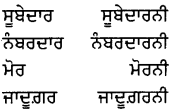
![]()
(ਇ) ‘ਈਂ ਵਧਾ ਕੇ

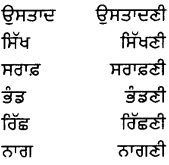
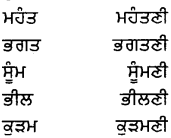
(ਸ) ਕੰਨਾ ‘τ’ ਵਧਾ ਕੇ
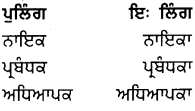


![]()
(ਹ) ‘ਕੰਨਾ + ਈਂ ਵਧਾ ਕੇ
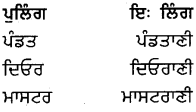


(ਕ) ‘ਕੀ ਜਾਂ ‘ੜੀ ਵਧਾ ਕੇ
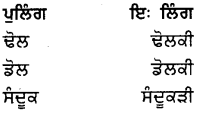


![]()
2. ਜੇਕਰ ਪੁਲਿੰਗ ਸ਼ਬਦਾਂ ਦੇ ਅਖ਼ੀਰ ਵਿਚ ਕੰਨਾ (τ) ਲੱਗਾ ਹੋਵੇ, ਤਾਂ ‘ਕੰਨੇ ਦੀ ਜਗ੍ਹਾ ਬਿਹਾਰੀ ( ੀ), ਜਾਂ ‘ਨ’ ਲਾ ਕੇ ਜਾਂ ਕੰਨਾ ਹਟਾ ਕੇ ਇਸਤਰੀ ਲਿੰਗ ਬਣਾਇਆ ਜਾਂਦਾ ਹੈ; ਜਿਵੇਂ –
(ਉ) ਕੰਨੇ ਦੀ ਥਾਂ “ਬਿਹਾਰੀ (ੀ) ਲਾ ਕੇ
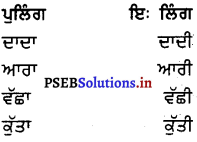
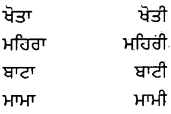
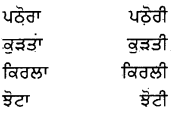
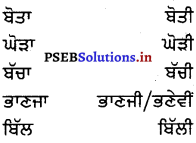
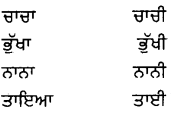
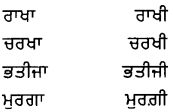
![]()
(ਆ) ਕੰਨੇ ਦੀ ਥਾਂ ‘ਨ ਲਾ ਕੇ
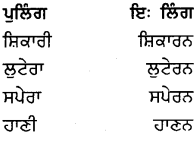
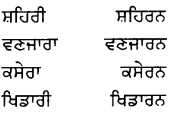
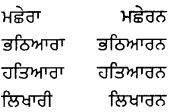
(ਈ) ‘ਕੰਨਾ (τ)’ ਹਟਾ ਕੇ

3. ਜੇਕਰ ਪੁਲਿੰਗ ਨਾਂਵ ਦੇ ਅਖ਼ੀਰ ਵਿਚ ਬਿਹਾਰੀ + ਆ ਹੋਵੇ, ਤਾਂ ਇਨ੍ਹਾਂ ਦੋਹਾਂ ਨੂੰ ਹਟਾ ਕੇ “ਨ’ ਜਾਂ ‘ਣ ਲਾ ਦਿੱਤਾ ਜਾਂਦਾ ਹੈ , ਜਿਵੇਂ –
ਪੁਲਿੰਗ – ਇ: ਲਿੰਗ
ਪੋਠੋਹਾਰੀਆ – ਪੋਠੋਹਾਰਨ
ਪੂਰਬੀਆ – ਪੂਰਬਣ
ਹਟਵਾਣੀਆ – ਹਟਵਾਣਨ
ਦੁਆਬੀਆ – ਦੁਆਬਣ
ਪਹਾੜੀਆ – ਪਹਾੜਨ
ਪਸ਼ੌਰੀਆ – ਪਸ਼ੌਰਨ
ਕਸ਼ਮੀਰੀਆ – ਕਸ਼ਮੀਰ
![]()
4. ਜੇਕਰ ਪੁਲਿੰਗ ਨਾਂਵ ਦੇ ਅੰਤ ਵਿਚ ਬਿਹਾਰੀ ਹੋਵੇ, ਤਾਂ ਬਿਹਾਰੀ ਹਟਾ ਕੇ ‘ਣ , “ਇਣ’ ਜਾਂ “ਆਣੀ’ ਲਾ ਕੇ ਇਸਤਰੀ ਲਿੰਗ ਬਣਾਇਆ ਜਾਂਦਾ ਹੈ; ਜਿਵੇਂ
(ਉ) ਬਿਹਾਰੀ ਦੀ ਥਾਂ ‘ਣ ਲਾ ਕੇ
ਪੁਲਿੰਗ – ਇ: ਲਿੰਗ
ਮਾਲ – ਮਾਲਣ
ਧੋਬੀ – ਧੋਬਣ
ਗੁਆਂਢੀ – ਗੁਆਂਢਣ
ਪੰਜਾਬੀ – ਪੰਜਾਬਣ
ਸਾਥੀ – ਸਾਥਣ
ਮੋਚੀ – ਮੋਚਣ
ਗਿਆਨੀ – ਗਿਆਨਣ
(ਅ) ਬਿਹਾਰੀ ‘ਈਂ ਦੀ ਥਾਂ “ਇਣ ਲਾ ਕੇ
ਪੁਲਿੰਗ – ਇ: ਲਿੰਗ
ਨਾਈ – ਨਾਇਣ
ਅਰਾਈਂ – ਅਰਾਇਣ
ਈਸਾਈ – ਈਸਾਇਣ
ਕਸਾਈ – ਕਸਾਇਣ
ਸੁਦਾਈ – ਸੁਦਾਇਣ
ਹਲਵਾਈ – ਹਲਵਾਇਣ
(ਇ) ਬਿਹਾਰੀ ਦੀ ਥਾਂ ਆਣੀ ਲਾ ਕੇ
ਪੁਲਿੰਗ – ਇ: ਲਿੰਗ
ਖੱਤਰੀ – ਖੱਤਰਾਣੀ
ਚੌਧਰੀ – ਚੌਧਰਾਣੀ
ਸਾਂਸੀ – ਸਾਂਸੀਆਣੀ
ਪਾਦਰੀ – ਪਾਦਰਆਣੀ
ਭਾਈ – ਭਾਈਆਣੀ
ਮਾਂਦਰੀ – ਮਾਂਦਰਆਣੀ
![]()
5. ਜੇਕਰ ਪੁਲਿੰਗ ਨਾਂਵ ਦੇ ਅਖੀਰ ਵਿਚ ‘ਦੁਲੈਂਕੜ ਹੋਵੇ ਤਾਂ ‘ਣੀ , ਜਾਂ ‘ਆਣੀ ਦਾ ਵਾਧਾ ਕਰ ਕੇ ਇਸਤਰੀ ਲਿੰਗ ਬਣਾਇਆ ਜਾਂਦਾ ਹੈ; ਜਿਵੇਂ –
ਪੁਲਿੰਗ – ਇ: ਲਿੰਗ
ਪੇਂਡੂ – ਪੇਂਡੂਆਣੀ
ਹਿੰਦੂ – ਹਿੰਦੂਆਣੀ
ਸਾਊ – ਸਾਊਆਣੀ
6. ਕਈ ਵਾਰੀ ਬਿਨਾਂ ਕਿਸੇ ਨੇਮ ਤੋਂ ਵੀ ਲਿੰਗ ਬਦਲੀ ਹੋ ਜਾਂਦੀ ਹੈ ਅਜਿਹੀ ਹਾਲਤ ਵਿਚ ਪੁਲਿੰਗ ਅਤੇ ਇਸਤਰੀ ਲਿੰਗ ਸ਼ਬਦ ਇਕ ਦੂਜੇ ਤੋਂ ਬਿਲਕੁਲ ਭਿੰਨ ਹੁੰਦੇ ਹਨ, ਜਿਵੇਂ –

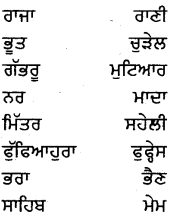

7. ਕਈ ਪੁਲਿੰਗਾਂ ਦੇ ਦੋ – ਦੋ ਇਸਤਰੀ ਲਿੰਗ ਹੁੰਦੇ ਹਨ ਅਤੇ ਕਈ ਇਸਤਰੀ ਲਿੰਗਾਂ ਦੇ ਦੋ – ਦੋ ਪੁਲਿੰਗ ਹੁੰਦੇ ਹਨ, ਜਿਵੇਂ –
ਪੁਲਿੰਗ – ਇ: ਲਿੰਗ
ਭਰਾ ਭੈਣ, – ਭਰਜਾਈ
ਸਾਲਾ – ਸਾਲੀ, ਸਾਲੇਹਾਰ
ਪੁੱਤ – ਧੀ, ਨੂੰਹ
ਸਾਲਾ, ਸਾਂਦੂ – ਸਾਲੀ
ਜਵਾਈ, ਪੁੱਤਰ – ਧੀ
ਭਰਾ, ਭਣਵੱਈਆ – ਭੈਣ
![]()
8. ਕਈ ਪੁਲਿੰਗ ਇਸਤਰੀ ਲਿੰਗ ਤੋਂ ਬਣਦੇ ਹਨ, ਜਿਵੇਂ –
ਇ: ਲਿੰਗ – ਪੁਲਿੰਗ
ਭੈਣ – ਭਣਵੱਈਆ
ਭੂਆ, ਫੁੱਫੀ – ਫੁੱਫੜ
ਮਾਸੀ – ਮਾਸੜ
ਨਿਨਾਣ – ਨਿਨਾਣਵਈਆ
ਨਣਦ – ਨਣਦੋਈਆ
ਰੇਤ – ਰੇਤ
9. ਕਈ ਵਾਰ ਪੁਲਿੰਗ ਸ਼ਬਦ ਦੁਆਰਾ ਕਿਸੇ ਚੀਜ਼ ਦੇ ਵੱਡੇ ਅਕਾਰ ਨੂੰ ਪ੍ਰਗਟ ਕੀਤਾ ਜਾਂਦਾ ਹੈ ਤੇ ਇਸਤਰੀ ਲਿੰਗ ਦੁਆਰਾ ਛੋਟੇ ਅਕਾਰ ਨੂੰ; ਜਿਵੇਂ –
ਇ: ਲਿੰਗ – ਪੁਲਿੰਗ
ਮੱਖੀ – ਮੁੱਖ
ਤੱਕੜੀ – ਤੱਕੜ
ਪਗੜੀ – ਪੱਗੜ
ਛਤਰੀ – ਛਤਰ
ਟੋਕਰੀ – ਟੋਕਰਾ
ਆਰੀ – ਆਰਾ
ਰੰਬਾ – ਰੰਬੀ
ਘੜਾ – ਘੜੀ
ਡੱਬਾ – ਡੱਬੀ
ਪ੍ਰਸ਼ਨ 3.
ਹੇਠ ਲਿਖੇ ਵਾਕਾਂ ਵਿਚੋਂ ਮੋਟੇ ਸ਼ਬਦਾਂ ਦੇ ਲਿੰਗ ਬਦਲ ਕੇ ਦੁਬਾਰਾ ਲਿਖੋ –
(ੳ) ਉਹ ਇਕ ਕਮਜ਼ੋਰ ਆਦਮੀ ਹੈ।
(ਅ) ਵੀਰ ਜੀ ਘਰ ਪਹੁੰਚ ਗਏ ਹਨ।
(ਈ) ਵਿਦਿਆਰਥੀ ਪੜ੍ਹ ਰਿਹਾ ਹੈ।
(ਸ) ਹਾਥੀ ਨਦੀ ਵਿਚ ਪਾਣੀ ਪੀ ਰਿਹਾ ਹੈ।
ਉੱਤਰ :
(ੳ) ਉਹ ਇਕ ਕਮਜ਼ੋਰ ਤੀਵੀਂ ਹੈ।
(ਅ) ਭੈਣ ਜੀ ਘਰ ਪਹੁੰਚ ਗਏ ਹਨ !
(ਇ) ਵਿਦਿਆਰਥਣ ਪੜ੍ਹ ਰਹੀ ਹੈ।
(ਸ) ਹਥਨੀ ਨਦੀ ਵਿਚ ਪਾਣੀ ਪੀ ਰਹੀ ਹੈ।
ਪ੍ਰਸ਼ਨ 4.
ਹੇਠ ਲਿਖੇ ਸ਼ਬਦਾਂ ਦੇ ਲਿੰਗ ਬਦਲੋ
(ਉ) ਸੱਪ, ਬੱਕਰਾ, ਹਾਥੀ, ਚਾਚਾ, ਵੱਛਾ, ਨਾਨੀ।
(ਆ) ਮਾਮੀ, ਧੋਬਣ, ਸੋਹਣੀ, ਤੇਲਣਾ।
(ਇ) ਪੁੱਤਰੀ, ਮੋਰਨੀ, ਨੌਕਰਾਣੀ, ਪੰਜਾਬੀ, ਰਾਗ।
ਉੱਤਰ :
(ੳ) ਸੱਪਣੀ, ਬੱਕਰੀ, ਹਾਥਣ, ਚਾਚੀ, ਵੱਛੀ, ਨਾਨਾ।
(ਅ) ਮਾਮਾ, ਧੋਬੀ, ਸੋਹਣਾ, ਤੇਲੀ।
(ਇ) ਪੁੱਤਰ, ਮੋਰ, ਨੌਕਰ, ਪੰਜਾਬਣ, ਰਾਗਣੀ।
![]()
ਪ੍ਰਸ਼ਨ 5.
ਹੁੰਠ ਲਿਖੇ ਵਾਕਾਂ ਨੂੰ ਲਿੰਗ ਬਦਲ ਕੇ ਦੁਬਾਰਾ ਲਿਖੋ
(ਉ) ਸ਼ੇਰ ਨੇ ਹਿਰਨ ਨੂੰ ਮਾਰ ਦਿੱਤਾ।
(ਆਂ) ਚਿੜੀਆ – ਘਰ ਵਿਚ ਅਸੀਂ ਬਾਂਦਰ, ਹਿਰਨ, ਸ਼ੇਰ ਤੇ ਹਾਥੀ ਦੇਖੇ।
(ਈ) ਕਾਲਾ ਬੱਦਲ ਵਰ ਕੇ ਚਲਾ ਗਿਆ।
(ਸ) ਉਹ ਖੂਹ ਵਿਚੋਂ ਡੋਲ ਨਾਲ ਪਾਣੀ ਕੱਢ ਰਿਹਾ ਸੀ।
ਉੱਤਰ :
(ੳ) ਸ਼ੇਰਨੀ ਨੇ ਹਿਰਨੀ ਨੂੰ ਮਾਰ ਦਿੱਤਾ।
(ਅ) ਚਿੜੀਆ – ਘਰ ਵਿਚ ਅਸੀਂ ਬਾਂਦਰੀਆਂ, ਹਿਰਨੀਆਂ, ਸ਼ੇਰਨੀਆਂ ਤੇ ਹਥਨੀਆਂ ਦੇਖੀਆਂ।
(ਈ) ਕਾਲੀ ਬੱਦਲੀ ਵਰੁ ਕੇ ਚਲੀ ਗਈ।
(ਸ) ਉਹ ਖੂਹੀ ਵਿਚੋਂ ਡੋਲਕੀ ਨਾਲ ਪਾਣੀ ਕੱਢ ਰਹੀ ਸੀ।
ਪ੍ਰਸ਼ਨ 6.
ਹੇਠ ਲਿਖੇ ਵਾਕਾਂ ਵਿਚੋਂ ਨਾਂਵ ਸ਼ਬਦਾਂ ਦੇ ਲਿੰਗ ਬਦਲ ਕੇ ਵਾਕ ਦੁਬਾਰਾ ਲਿਖੋ :
(ਉ) ਮਦਾਰੀ ਨੇ ਬਾਂਦਰ ਨਾਲ ਲੜਕਿਆਂ ਨੂੰ ਤਮਾਸ਼ਾ ਵਿਆਖਿਆ।
(ਅ) ਨਵੀਂ ਬਣੀ ਸਰਪੰਚਣੀ ਨੇ ਔਰਤਾਂ ਨੂੰ ਸੰਬੋਧਨ ਕੀਤਾ।
(ਈ) ਉਸ ਦਾ ਪਿਤਾ ਪਹਿਲਾਂ ਦਿੱਲੀ ਵਿਚ ਰਹਿੰਦਾ ਸੀ।
(ਸ) ਸ਼ੇਰ ਨੇ ਹਿਰਨ ਤੇ ਬਾਂਦਰ ਨੂੰ ਮਾਰ ਦਿੱਤਾ।
(ਹ) ਮੁੰਡੇ ਨੇ ਆਪਣੀ ਤਾਈ ਨਾਲ ਜਾ ਕੇ ਹਥਨੀ ਦੇਖੀ।
(ਕ) ਮੇਰੇ ਪਿਤਾ ਜੀ ਇਕ ਪ੍ਰਸਿੱਧ ਲੇਖਕ ਹਨ।
(ਖ ਮਾਲਕਣ ਆਪਣੇ ਕੁੱਤੇ ਨੂੰ ਕੰਘੀ ਵਾਹ ਰਹੀ ਸੀ।
ਉੱਤਰ :
(ੳ) ਮਦਾਨ ਨੇ ਬਾਂਦਰੀ ਨਾਲ ਲੜਕੀਆਂ ਨੂੰ ਤਮਾਸ਼ਾ ਵਿਆਖਿਆ।
(ਅ) ਨਵੇਂ ਬਣੇ ਸਰਪੰਚ ਨੇ ਮਰਦਾਂ ਨੂੰ ਸੰਬੋਧਨ ਕੀਤਾ।
(ਈ) ਉਸ ਦੀ ਮਾਤਾ ਪਹਿਲਾਂ ਦਿੱਲੀ ਵਿਚ ਰਹਿੰਦੀ ਸੀ।
(ਸ) ਸ਼ੇਰਨੀ ਨੇ ਹਿਰਨੀ ਤੇ ਬਾਂਦਰੀ ਨੂੰ ਮਾਰ ਦਿੱਤਾ।
(ਹ) ਕੁੜੀ ਨੇ ਆਪਣੇ ਤਾਏ ਨਾਲ ਜਾ ਕੇ ਹਾਥੀ ਦੇਖਿਆ।
(ਕ) ਮੇਰੇ ਮਾਤਾ ਜੀ ਇਕ ਪ੍ਰਸਿੱਧ ਲੇਖਿਕਾ ਹਨ।
(ਖ) ਮਾਲਕ ਆਪਣੀ ਕੁੱਤੀ ਨੂੰ ਕੰਘਾ ਵਾਹ ਰਿਹਾ ਸੀ।
![]()
ਪ੍ਰਸ਼ਨ 7.
ਹੇਠ ਲਿਖੇ ਵਾਕਾਂ ਵਿਚ ਆਏ ਨਾਂਵ ਸ਼ਬਦਾਂ ਦੇ ਲਿੰਗ ਬਦਲ ਕੇ ਵਾਕ ਮੁੜ ਲਿਖੋ
(ਉ) ਸਾਧੂ ਨੇ ਭਗਤ ਦੇ ਮੱਥੇ ਤੇ ਤਿਲਕ ਲਾ ਦਿੱਤਾ
(ਅ) ਤੁਹਾਡੇ ਮਾਸੜ ਜੀ ਇਕ ਪ੍ਰਸਿੱਧ ਕਵੀ ਹਨ !
(ਈ) ਰਾਜਾ ਤਰਖਾਣ, ਲੁਹਾਰ ਤੇ ਦਰਜ਼ੀ ਨੂੰ ਨਾਲ ਲੈ ਕੇ ਜੰਗਲ ਵਲ ਚੱਲ ਪਿਆ।
(ਸ) ਨਵੇਂ ਸਰਪੰਚ ਨੇ ਪਿੰਡ ਦੇ ਨੌਜੁਆਨ ਮੁੰਡਿਆਂ ਤੇ ਬੁੱਢਿਆਂ ਨੂੰ ਮਿਲ ਕੇ ਕੰਮ ਕਰਨ ਲਈ ਕਿਹਾ।
(ਹ) ਦਾਦੇ ਨੇ ਰੋਂਦੇ ਪੋਤਰੇ ਨੂੰ ਚੁੱਕ ਕੇ ਛਾਤੀ ਨਾਲ ਲਾ ਲਿਆ
ਉੱਤਰ :
(ੳ) ਸਾਧਣੀ ਨੇ ਭਗਤਣੀ ਦੇ ਮੱਥੇ ਤੇ ਤਿਲਕ ਲਾ ਦਿੱਤਾ।
(ਅ) ਤੁਹਾਡੇ ਮਾਸੀ ਜੀ ਇਕ ਪ੍ਰਸਿੱਧ ਕਵਿਤੀ ਹਨ।
(ਈ) ਰਾਣੀ ਤਰਖਾਣੀ, ਲੁਹਾਰੀ ਤੇ ਦਰਜ਼ਿਆਣੀ ਨੂੰ ਨਾਲ ਲੈ ਕੇ ਜੰਗਲ ਵਲ ਚਲ ਪਈ।
(ਸ) ਨਵੀਂ ਸਰਪੰਚਣੀ ਨੇ ਪਿੰਡ ਦੀਆਂ ਨੌਜੁਆਨ ਕੁੜੀਆਂ ਤੇ ਬੁੱਢੀਆਂ ਨੂੰ ਮਿਲ ਕੇ ਕੰਮ ਕਰਨ ਲਈ ਕਿਹਾ
(ਹ) ਦਾਦੀ ਨੇ ਰੋਂਦੀ ਪੋਤਰੀ ਨੂੰ ਚੁੱਕ ਕੇ ਛਾਤੀ ਨਾਲ ਲਾ ਲਿਆ।
ਪ੍ਰਸ਼ਨ 8.
ਹੇਠ ਲਿਖੇ ਵਾਕਾਂ ਵਿਚ ਆਏ ਨਾਂਵ ਸ਼ਬਦਾਂ ਦੇ ਲਿੰਗ ਬਦਲ ਕੇ ਵਾਕਾਂ ਵਿਚ ਵਰਤੋ
(ਉ) ਮਾਤਾ ਜੀ ਨੇ ਭਿਖਾਰੀ ਨੂੰ ਤਨ ਦਾ ਕੱਪੜਾ ਦਿੱਤਾ ਤੇ ਉਸਨੇ ਅਸੀਸ ਦਿੱਤੀ।
(ਅ) ਕਵੀ ਦੀ ਕਵਿਤਾ ਤੋਂ ਪ੍ਰਸੰਨ ਹੋ ਕੇ ਬਾਬਾ ਜੀ ਨੇ ਪੰਜਾਹ ਰੁਪਏ ਇਨਾਮ ਦਿੱਤਾ।
(ਈ) ਘੁਮਿਆਰ, ਨਾਈ, ਮੋਚੀ, ਤਰਖਾਣ ਤੇ ਲੁਹਾਰ ਸਭ ਇੱਕੋ ਮੁਹੱਲੇ ਵਿਚ ਰਹਿੰਦੇ ਹਨ।
(ਸ਼) ਵਕੀਲ, ਡਾਕਟਰ ਤੇ ਮਾਸਟਰ ਮਿਲ ਕੇ ਸਲਾਹਾਂ ਕਰ ਰਹੇ ਹਨ।
(ਹ) ਮੇਰੇ ਭੂਆ ਜੀ ਨੇ ਦੋ ਬੱਕਰੀਆਂ ਰੱਖੀਆਂ ਹੋਈਆਂ ਹਨ।
(ਕ) ਰਾਜੇ ਕੋਲ ਦੋ ਨੌਕਰ, ਚਾਰ ਹਾਥੀ, ਤਿੰਨ ਘੋੜੇ ਤੇ ਇਕ ਕੁੱਤਾ ਸੀ।
(ਖ) ਰੁੱਖ ਉੱਤੇ ਉੱਲੂ, ਕਾਂ, ਕਬੂਤਰ ਅਤੇ ਚਿੜੀ ਬੈਠੇ ਸਨ।
ਉੱਤਰ :
(ੳ) ਪਿਤਾ ਜੀ ਨੇ ਭਿਖਾਰਨ ਨੂੰ ਤਨ ਦਾ ਕੱਪੜਾ ਦਿੱਤਾ ਤੇ ਉਸਨੇ ਅਸੀਸ ਦਿੱਤੀ।
(ਅ) ਕਵਿਤੀ ਦੀ ਕਵਿਤਾ ਤੋਂ ਪ੍ਰਸੰਨ ਹੋ ਕੇ ਦਾਦੀ ਜੀ ਨੇ ਪੰਜਾਹ ਰੁਪਏ ਇਨਾਮ ਦਿੱਤਾ।
(ਇ) ਘੁਮਿਆਰੀਆਂ, ਨਾਇਣਾਂ, ਮੋਚਣਾਂ, ਤਰਖਾਣੀਆਂ ਤੇ ਲੁਹਾਰੀਆਂ ਸਭ ਇੱਕੋ ਮੁਹੱਲੇ
(ਸ਼) ਵਿਚ ਰਹਿੰਦੀਆਂ ਹਨ। ਸ ਵਕੀਲਣੀਆਂ, ਡਾਕਟਰਾਣੀਆਂ ਤੇ ਮਾਸਟਰਾਣੀਆਂ ਮਿਲ ਕੇ ਸਲਾਹਾਂ ਕਰ ਰਹੀਆਂ ਹਨ।
(ਹ) ਮੇਰੇ ਫੁੱਫੜ ਜੀ ਨੇ ਦੋ ਬੱਕਰੇ ਰੱਖੇ ਹੋਏ ਹਨ।
(ਕ) ਰਾਜੇ ਕੋਲ ਦੋ ਨੌਕਰਾਣੀਆਂ, ਚਾਰ ਹਥਣੀਆਂ, ਤਿੰਨ ਘੋੜੀਆਂ ਤੇ ਇਕ ਕੁੱਤੀ ਸੀ।
(ਖ) ਰੁੱਖ ਉੱਤੇ ਬਤੌਰੀ, ਕਾਉਣੀ ਤੇ ਚਿੜਾ ਬੈਠੇ ਸਨ।
![]()
ਪ੍ਰਸ਼ਨ 9.
ਹੇਠ ਲਿਖੇ ਵਾਕਾਂ ਵਿਚ ਆਏ ਨਾਂਵ ਸ਼ਬਦਾਂ ਦੇ ਲਿੰਗ ਬਦਲ ਕੇ ਵਾਕ ਮੁੜ ਲਿਖੋ \
(ਉ) ਗੱਭਰੂ ਖ਼ੁਸ਼ੀ ਵਿਚ ਭੰਗੜਾ ਪਾ ਰਹੇ ਹਨ।
(ਅ) ਬਿੱਲੀ ਨੇ ਪਤੀਲੇ ਵਿਚਲਾ ਦੁੱਧ ਪੀ ਲਿਆ।
(ਇ) ਬਘਿਆੜ ਨੇ ਭੇਡ ਨੂੰ ਪਾੜ ਕੇ ਖਾ ਲਿਆ।
ਉੱਤਰ :
(ੳ) ਮੁਟਿਆਰਾਂ ਖੁਸ਼ੀ ਵਿਚ ਭੰਗੜਾ (ਗਿੱਧਾ) ਪਾ ਰਹੀਆਂ ਹਨ।
(ਅ) ਬਿੱਲੇ ਨੇ ਪਤੀਲੀ ਵਿਚਲਾ ਦੁੱਧ ਪੀ ਲਿਆ।
(ਈ) ਬਘਿਆੜੀ ਨੇ ਭੇਡੂ ਨੂੰ ਪਾੜ ਕੇ ਖਾ ਲਿਆ।
ਪ੍ਰਸ਼ਨ 10.
ਹੇਠ ਲਿਖੇ ਵਾਕਾਂ ਵਿਚ ਆਏ ਨਾਂਵ ਸ਼ਬਦਾਂ ਦੇ ਲਿੰਗ ਬਦਲ ਕੇ ਵਾਕ ਨੂੰ ਮੁੜ ਲਿਖੋ
(ਉ) ਬੇਗ਼ਮ ਆਪਣੀਆਂ ਗੋਲੀਆਂ ਅਤੇ ਸਹੇਲੀਆਂ ਨਾਲ ਜਾ ਰਹੀ ਸੀ।
(ਅ) ਪਿੰਡਾਂ ਵਿਚ ਜੱਟ, ਬ੍ਰਾਹਮਣ, ਨਾਈ, ਸਿੱਖ ਤੇ ਹਿੰਦੂ ਰਹਿੰਦੇ ਹਨ।
(ਇ) ਲੇਖਾਂ ਮਾਂਵਾਂ – ਧੀਆਂ ਦਾ।
ਉੱਤਰ :
(ਉ) ਬਾਦਸ਼ਾਹ ਆਪਣੇ ਗੋਲਿਆਂ ਅਤੇ ਮਿੱਤਰਾਂ ਨਾਲ ਜਾ ਰਿਹਾ ਸੀ।
(ਅ) ਪਿੰਡਾਂ ਵਿਚ ਜੱਟੀਆਂ, ਬਾਹਮਣੀਆਂ, ਨਾਇਣਾਂ, ਸਿੱਖਣੀਆਂ ਤੇ ਹਿੰਦਣੀਆਂ ਰਹਿੰਦੀਆਂ ਹਨ।
(ਈ) ਲੇਖਾ ਪਿਓਆਂ – ਪੁੱਤਰਾਂ ਦਾ।
![]()
ਪ੍ਰਸ਼ਨ 11.
ਹੇਠ ਲਿਖੇ ਵਾਕਾਂ ਵਿਚ ਆਏ ਨਾਂਵ ਸ਼ਬਦਾਂ ਦੇ ਲਿੰਗ ਬਦਲ ਕੇ ਵਾਕ ਮੁੜ ਲਿਖੋ
(ਉ) ਮੁੰਡੇ ਨੇ ਬਲੂੰਗੜੇ ਨੂੰ ਫੜ ਲਿਆ।
(ਅ) ਬਾਗ਼ ਵਿਚ ਮੋਰ, ਤਿੱਤਰ, ਕਬੂਤਰ ਤੇ ਚਿੜੀਆਂ ਰਹਿੰਦੀਆਂ ਹਨ।
(ਈ) ਕੁੜਮ ਆਪਣੇ ਕੁੜਮ ਨੂੰ ਖ਼ੁਸ਼ ਹੋ ਕੇ ਮਿਲਿਆ
ਉੱਤਰ :
(ਉ) ਕੁੜੀ ਨੇ ਬਲੂੰਗੜੀ ਨੂੰ ਫੜ ਲਿਆ।
(ਅ) ਬਾਗ਼ ਵਿਚ ਮੋਰਨੀਆਂ, ਤਿੱਤਰੀਆਂ, ਕਬੂਤਰੀਆਂ ਤੇ ਚਿੜੇ ਰਹਿੰਦੇ ਹਨ।
(ਈ) ਕੁੜਮਣੀ ਆਪਣੀ ਕੁੜਮਣੀ ਨੂੰ ਖ਼ੁਸ਼ ਹੋ ਕੇ ਮਿਲੀ !


